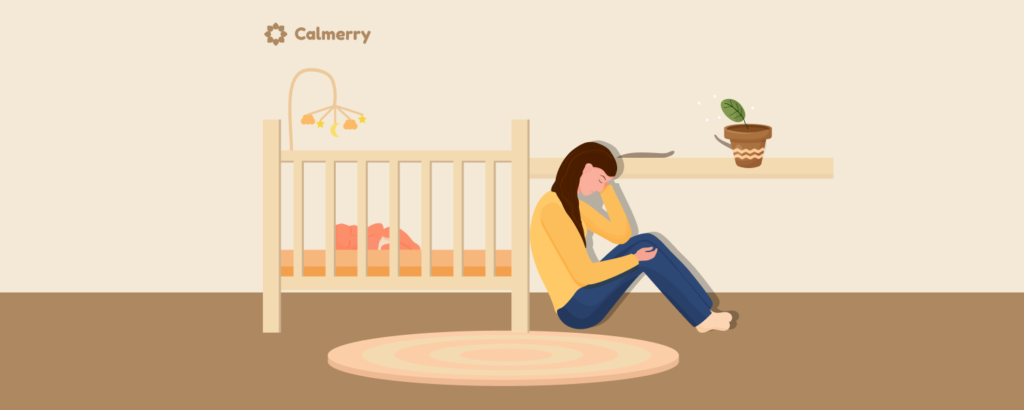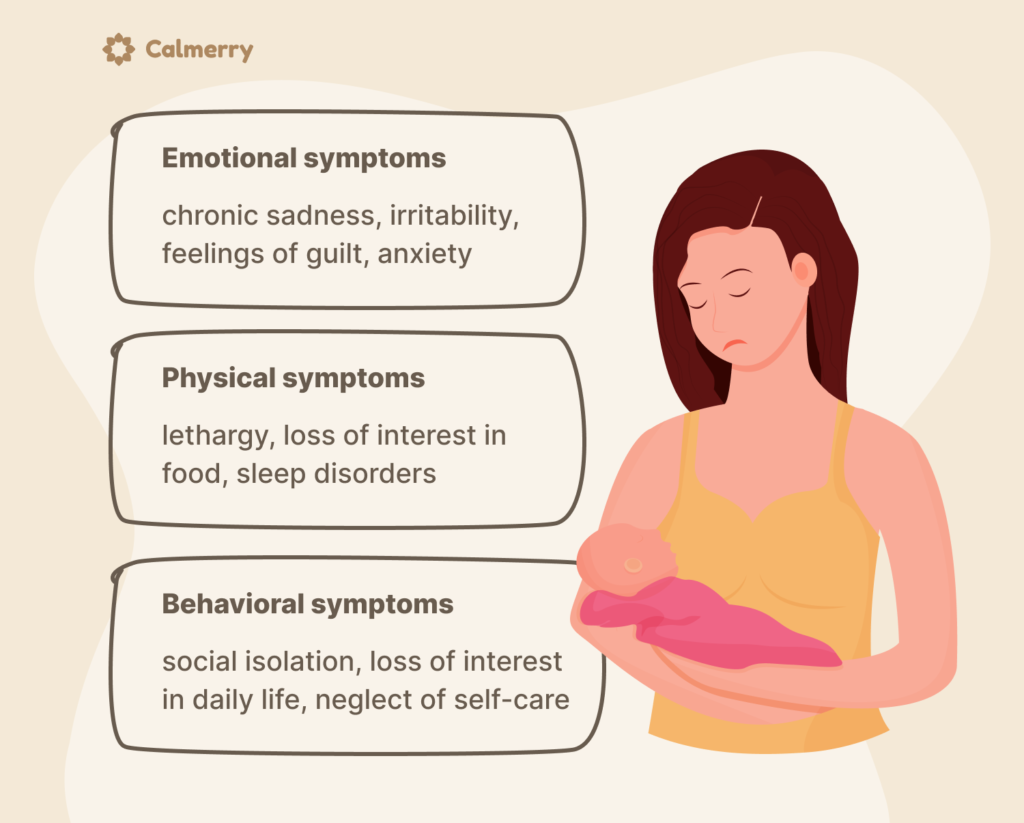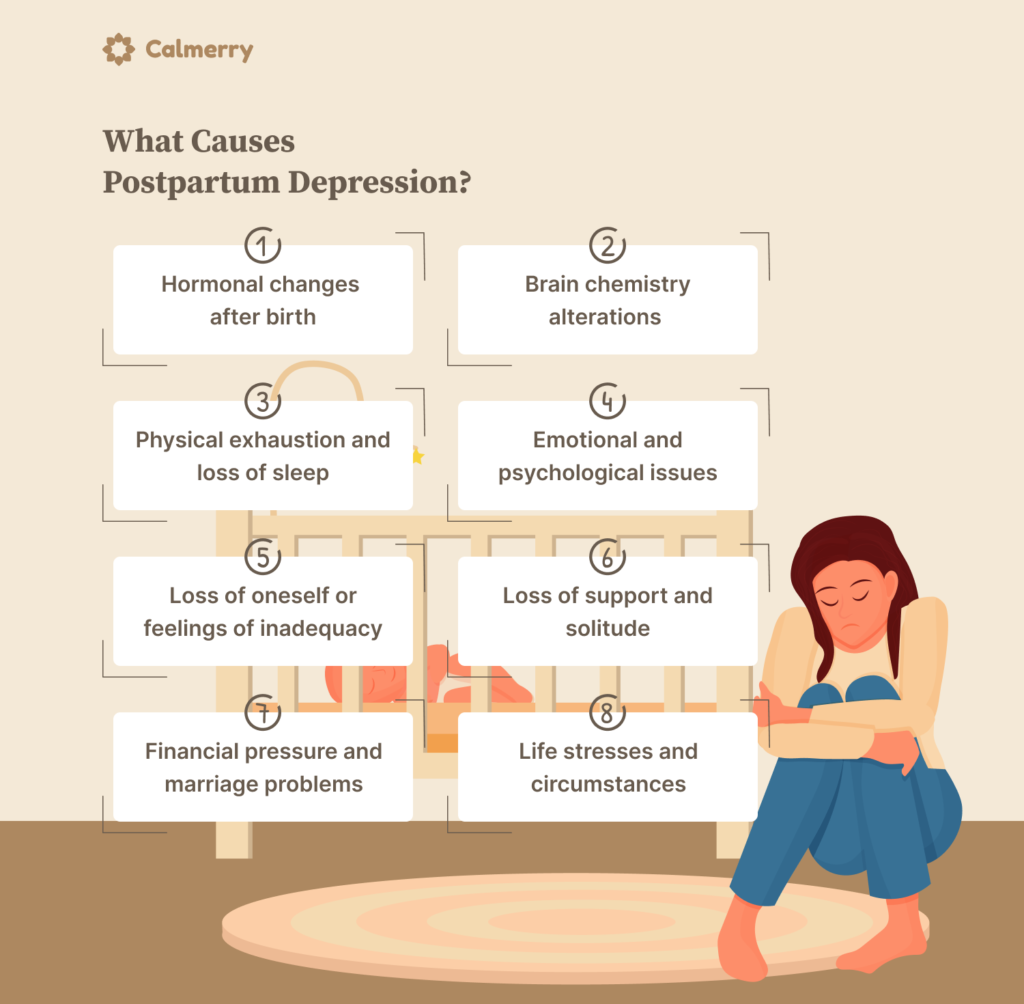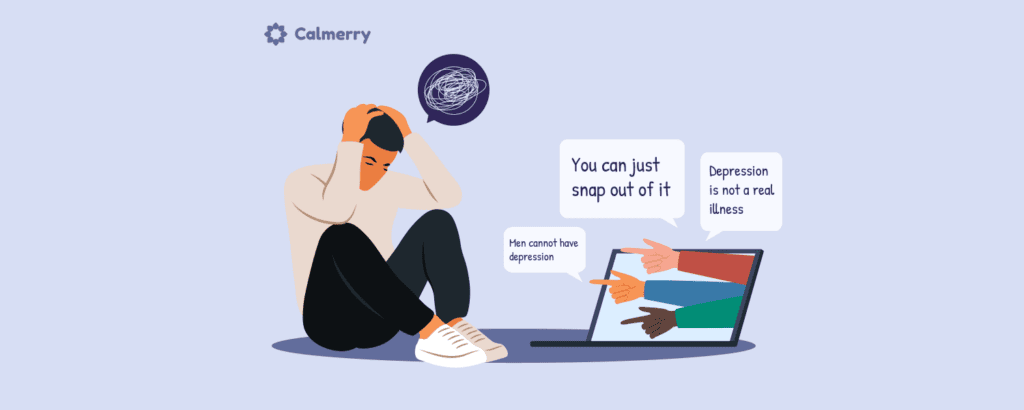Why Does Postpartum Depression Happen?

In this article
Postpartum depression is a significant psychiatric illness that may occur after giving birth. It influences mood, energy, and regular activities, and therefore, the mothers find it hard to associate or care for the babies. Unlike the short-term baby blues, postpartum depression only ends with seeking the help of experts.
It is crucial to understand this condition because it is a common occurrence that is often misinterpreted. Early recognition of symptoms ensures early treatment and prevents both the mother and the baby.
Here, in this article by Calmerry, you will learn what postpartum depression is, why it happens, how long it lasts, and what treatments, such as online depression therapy, are able to assist in the treatment and restore the balance of emotions.
What is postpartum depression?
Postpartum depression (PPD) is a serious mental health condition that develops after childbirth. Unlike the baby blues, which cause mild mood swings and usually resolve within 2 weeks, PPD involves intense and lasting symptoms such as sadness, anxiety, and loss of interest in daily life.
About 1 in 8 women experience postpartum depression, though it can also affect fathers or partners. [1] Bauman, B. L., Ko, J. Y., Cox, S., Mph, D. V. D., Warner, L., Folger, S., Tevendale, H. D., Coy, K. C., Harrison, L., & Barfield, W. D. (2020). Vital signs: Postpartum depressive symptoms and provider discussions about perinatal Depression — United States, 2018. MMWR Morbidity and Mortality Weekly Report, 69(19), 575–581. https://doi.org/10.15585/mmwr.mm6919a2 It occurs across all demographics, regardless of age, culture, or economic status.
The main symptoms of postpartum depression

Postpartum depression symptoms in every new mother are different, but typically, the condition demonstrates a combination of behavioral, physical, and emotional alterations lasting beyond the initial few weeks of delivery.
Emotional symptoms can include chronic sadness, irritability, feelings of guilt, or anxiety. These states of mind make it difficult to bond with the baby. Physical symptoms can include lethargy, loss of interest in food, and sleep disorders unrelated to the new baby. These symptoms illuminate the impact of depression on the body and mind.
With time, behavioral symptoms may arise. This involves social isolation, loss of interest, or neglect of self-care. These alterations may cause interference in bonding and everyday activities. Unlike the short-acting baby blues, the duration of PPD can be weeks or even months, and the condition may even deteriorate without intervention. Identification of these symptoms and access to mental health care are the beginning of effective management.
What causes postpartum depression?

Postpartum depression occurs due to the interaction of biological, psychological, and environmental factors of both pre- and post-delivery. It serves to highlight the significance of the condition not just to the mother, but also to the child.
- Hormonal changes after birth. After birth, the hormones estrogen and progesterone drop substantially. They affect the brain chemicals known to regulate mood. These alterations, along with low levels of thyroid hormone, can result in emotional lability and place individuals at risk of postpartum depression.
- Brain chemistry alterations. Changing neurotransmitter function influences mood and motivation. That’s the reason depression during and after pregnancy may go on for months or even longer.
- Physical exhaustion and loss of sleep. Stress of having a new baby and perpetual loss of sleep wears down emotional reserves and leaves you less able to nurture your own little one.
- Physical postpartum convalescence. Pain, hormone imbalance, and lethargy con-
tribute to physical and emotional stress. - Emotional and psychological issues. A history of depression or anxiety, a troubled delivery, or trouble caring for your baby places you at risk. By itself, depression can affect your baby by restricting emotional interaction and appropriate care.
- Loss of oneself or feelings of inadequacy. Most new mothers feel ill-equipped for the transformation of becoming mothers, exacerbating sadness or feelings of uselessness.
- Loss of support and solitude. Loss of support from partners or families, solitude, and social isolation may contribute to symptoms of depression.
- Financial pressure and marriage problems. Marital problems or unstable finances frequently make emotional recovery more challenging.
- Life stresses and circumstances. Unwanted pregnancies, loss of the preexisting pregnancy, or illness induce heightened emotional tension. In certain cases, severe symptoms trigger postpartum psychosis, a life-threatening condition necessitating prompt attention.
If the symptoms are not disappearing, you should consult your healthcare provider and discuss the possibilities of counseling, therapy, or medication. Antidepressants may be prescribed, as needed, and FDA-licensed for the management of women postpartum.
[jhighlight]Regular depression screening identifies PPD early[/highlight]. If you are considering self-harm, call 988 right now for the Suicide and Crisis Lifeline.
It is, nonetheless, treatable and not an unfamiliar phenomenon postpartum. Through the right counseling, therapy, and professional care, you shall be okay, and you and your baby shall be just fine.
How long does postpartum depression last?

The length of postpartum depression (PPD) also differs for every individual, but symptoms of postpartum depression can persist for many months or even years.
Factors include the cause, how severe the symptoms are, and the availability of treatment. Depression occurs frequently and throughout pregnancy and even recovers in months or even years without the right assistance.
Symptoms should resolve within weeks once hormone balance normalizes. If the imbalance of hormones, tension, or nonsupport persists, the time frame for returning lengthens. After the birth of the child, the hormones of progesterone and estrogen taper off substantially and might take months to come into balance, impacting energy and mood.
Unless treated, PPD may become another, even more severe form of depression, such as postpartum psychosis, which requires emergency treatment. Depression may have an impact on your baby by minimizing bonding and emotional interaction, so by getting treated, both the child and the mother are gaining.
Postpartum depression treatments that actually work
Effective postpartum depression treatments focus on restoring emotional balance, regulating hormones, and improving overall well-being. Since this type of depression can vary in severity, treatment should be tailored by a healthcare professional.
Therapy options
- Psychotherapy (talk therapy): Talking to a therapist helps process emotions and strengthens coping mechanisms.
- Cognitive Behavioral Therapy (CBT): This CBT treatment of PPD identifies and replaces negative thinking.
- Interpersonal Therapy (IPT): This therapy reinforces relationships and social connections and reduces solitude.
- Group therapy: Support groups of new mothers exchange experiences and mitigate isolation.
- Couple or family therapy: This assists the couple in understanding PPD and enhancing communication.
- Online counseling: Platforms like Calmerry offer private sessions through online depression therapy, allowing mothers to get care from home.
Medication options
When symptoms are severe or of moderate intensity, the doctor may prescribe antidepressants. Some are FDA-approved for use after birth and are compatible during breastfeeding. Discuss the risks and benefits of these medications and the rewards of breastfeeding your child with your healthcare provider.
Lifestyle and Supportive Approaches
- Exercise: Short walks help increase hormones and improve mood.
- Balanced Diet: Good nutrition is essential for hormone restoration and brain well-being.
- Appropriate Rest: Emotions are consolidated by sleep.
- Peer Support: Online or face-to-face groups put the mothers at ease.
- Partner and Family Involvement: Shared communication and mutual caring promote healing and better care of the fetus.
Why mental health matters after having a baby
Maintaining mental health after childbirth is as vital as physical recovery. Many new parents underestimate how much depression after pregnancy can impact both mother and baby. Untreated symptoms can hinder bonding, affect care for your newborn, and cause long-term emotional and developmental issues.
Recognizing helps families pay attention to early warning signals such as perpetual sadness, anxiety, or loss of interest in regular activities. If these symptoms present, consult your doctor for assessment and screening for depression.
Below are the methods to help the mental health:
- Rest and proper nutrition are best for hormone restoration.
- Get connected with useful people and participate in therapy groups or peer support.
- Specify realistic expectations and request assistance with childcare.
- Conduct internet depression therapy for convenient, professional help.
Finding the right online therapists for you
It is crucial to find the proper therapist to heal from postpartum depression. Online therapy provides convenient, discreet, and accommodating support for new mothers who might have trouble making office appointments because of time or childcare.
Benefits of online therapy:
- Easy access from home while looking after your baby.
- Adaptable scheduling to fit the new routines of the parent.
- Greater access to licensed therapists trained in postpartum depression.
- Continuous communication by means of chat or video session throughout regular support.
It offers evidence-based, professional, and convenient online therapy for mothers suffering from PPD. Its licensed therapists, utilizing proven approaches such as CBT, IPT, and other effective methods, assist in managing symptoms, rebuilding confidence, and balancing emotions.
When selecting a therapist, look for therapists who are well-qualified to treat postpartum depression and perinatal psychiatric disorders. You can always talk to your healthcare provider if you are unsure of the best protocol or if you should include medication as part of your treatment.
Online or offline counseling works most effectively in the early stages. Under the right therapist, you are able to heal emotionally, and the mother ends up cared for and empowered by the new role.
Moving forward after postpartum depression
Postpartum depression may be solitary, but it is treatable and common. Most of the same issues occur for the same parent both during and after delivery. Treatment and recovery are achievable.
Recovery does not happen overnight. Assistance through the help of professionals, loving loved ones, and appropriate care works towards balancing you and bringing joy.
Seeking treatment is crucial for your well-being and for providing your baby with a healthy living situation.
Calmerry, as an online therapy platform, can provide convenient access to caring, online counseling, making it possible for you to embark on your healing journey from anywhere.
Bauman, B. L., Ko, J. Y., Cox, S., Mph, D. V. D., Warner, L., Folger, S., Tevendale, H. D., Coy, K. C., Harrison, L., & Barfield, W. D. (2020). Vital signs: Postpartum depressive symptoms and provider discussions about perinatal Depression — United States, 2018. MMWR Morbidity and Mortality Weekly Report, 69(19), 575–581. https://doi.org/10.15585/mmwr.mm6919a2
online therapy
live video session



